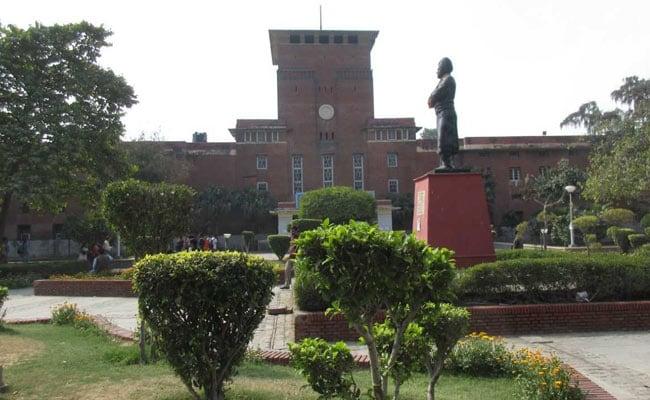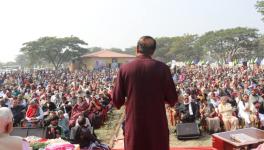Make-in-India: A New Social Science for Tomorrow

Image Used for Representational Purpose Only
The social sciences were always perceived as a poor man’s career option; as a last resort for those keen to pursue higher education. They never dominated the horizon of knowledge-production in India, but now they have come under unprecedented assault from the current regime. True, the Right makes no pretense of its disdain for the social sciences, but even previous regimes at the Centre and the states continuously attacked this branch of knowledge. While the current regime disdains the political and social narratives it has produced in the past few decades, previous regimes undermined them to pave a golden path for self-financed and market-friendly courses that produce more gainful employment.
A sustained decline in the social sciences goes hand-in-hand with the growing threats to democracy. This often-forgotten phenomenon has many dimensions that require careful examination. Social sciences encourage reflection at the level of society. The absence of such contemplation spells the end of an open society, dialogue and the celebration of differences of opinion, which are hallmarks of collective living.
There are both internal and external reasons for the decline in the relevance of social sciences. The external reasons include the attacks by political regimes that undermine it by withdrawing funding. Of late, this has been achieved by encouraging anti-intellectualism. The internal reasons include the very content of social sciences: They are struggling to produce knowledge systems that speak to the vast majority of social groups.
The social sciences have been unable to foster the kind of change that members of diverse social groups wish to see in their own social positions. Their failure in articulating aspirations for mobility and providing sustainable alternatives to modern conflicts is a result of a normative crisis in modern social sciences. In the post-war period, and especially during the 1960s, the emphasis of social sciences shifted from normative concerns and substantive principles of justice to relativism and the questioning of deep moral concerns.
Relativism displaced notions of truth, morality and ethics with contextual truths and amoral modes of theorisation. It posited that multiple alternatives could coexist, without one hegemonising the other. This effectively fructified in modern visions of multiculturalism, where social groups—religious, caste, racial or ethnic—could pursue their own way of life as long as they do not impinge on others and none laid claim to the universal or only-correct or morally superior way of life.
While this kind of a shift in social knowledge and policy frame itself lent a breathing space to contain social conflicts, such a truce came at the cost of collective living, deeper bonds, solidarity and sense of belonging. Much of Europe realised that multiculturalism only temporarily buried conflicts. It did not alter them in any significant way.
In India, the idea of contextual knowledge and the social construction of all principles as being essentially contingent led, at one end, to robust questioning of the “imperialism of categories” imposed by the colonial powers on the colonised. At the other end, it also led to “fundamentalism of experience”. Every group—religious, caste and gender—began to claim authenticity of its own experience, closing off any external interrogation. One religion could not speak for another; one caste could not speak for the other, and so on. This mode of authentic insularity found great resonance in dalit-bahujan politics.
During the 1970s, most social science discourse in India was caught between post-colonial critique of the ‘imperialism of categories’ on the one hand, and the subaltern articulation of ‘fundamentalism of experience’ on the other. In fact, one strengthened the other. The central project of dialogue between worldviews got aborted. Instead, the very notion of possessing a worldview became archaic. Loosely-defined contextual precepts that could be rejected and displaced with the changing context became the standard. Ironically, this did not lead to a more open society marked by dialogue and self-reflection but more insularity from any ‘external’ vantage point to one’s own way of living. This left very little meaningful space for social sciences.
The second major source of the decline came from the positivist-empirical methodological rigidity of the social sciences. On the one hand came the move towards relativism. On the other, the field still wished to hold on to its methodological concerns of evidence, data, statistics and numbers. Positivist methods and relativist social principles hollowed out social sciences from within.
This crisis is clearly apparent in the rampant failure of psephologists in marking electoral trends and voting behaviour. Most election surveys, unless it was a strong wave like in 2019, could neither predict electoral behavior, nor explain the reasons for such behaviour. What they required was innovation in their methodology. The traditional protocols of social science do not allow for capturing intangible psychological factors that drive human behaviour—the unsaid terrain of fantasy, imagination, public morality, and everyday social ethics. This is when behaviouralism staged a comeback.
Behavioral economics made a comeback to predict and explain market trends, the Sensex, and cultural beliefs as part of economic activity. Now we require further innovation to break disciplinary boundaries in the social sciences and end the over-emphasis on specialisation. No phenomenon in social life is standalone. Further, positivist methods need to be supplanted, not by relativism but by privileging intuitive reasoning. There is a need to look for explanations in unlikely intersections of social issues.
It was the vacuum in cross-sectional social life in general, and the perceptible emptiness in social sciences in particular, that got a final blow once the Right came into dominance. India’s current ruling dispensation came with a wholesome disdain for social sciences and experimental knowledge systems. They sought to replace and answer the felt-emptiness with simple-minded certainty. They came with ideas of absolute certainty, Utopia of a glorious past and distrust of differences and dialogue.
People at large bought into their solution, as something more authentic than alternatives offered by modernist social systems of knowledge. The complexities of modernity combined with relativism of social knowledge only made the social sciences cringe with even more self-doubt and it offered circular or tautological arguments that reflected its inner, normative crisis. The deliberate policy slant in favour of natural sciences added to this crisis.
The Right in India favours the sciences over social sciences for it displaces social questions. Also, ostensibly, it goes along with the kind of certitude it is looking for in political and social life.
Ajay Gudavarthy is associate professor, Centre for Political Studies, Jawaharlal Nehru University, New Delhi. The views are personal.
Get the latest reports & analysis with people's perspective on Protests, movements & deep analytical videos, discussions of the current affairs in your Telegram app. Subscribe to NewsClick's Telegram channel & get Real-Time updates on stories, as they get published on our website.





















